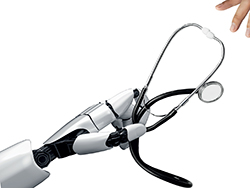 The rise of virtual and digitally powered health services has been accelerated by the pandemic – but are national health services, private suppliers, patients and investors really ready for the world of the robot doctor?
The rise of virtual and digitally powered health services has been accelerated by the pandemic – but are national health services, private suppliers, patients and investors really ready for the world of the robot doctor?
Imagine a world where you can access quality expert medical advice when you want. No long waits in a surgery or clinic to see an overworked doctor. No waiting at home for an out-of-hours locum to arrive at your door.
The idea of GP consultations online or via phone has not traditionally been welcomed by the public, who are used to – and have expected – face-to-face appointments. But Covid-19 has to a large extent changed this.
GP surgeries have avoided personal appointments wherever possible during the pandemic, and patients understandably have been reticent about visiting health centres for fear of infection.
Other areas, such as physiotherapy and psychiatry, have had to rethink how their essential services can be safely delivered.
The answer in many instances has been to embrace technology – to turn to digital innovation to provide timely consultation and speedy diagnosis.
But what else can technology offer and how can it improve patient outcomes and experiences? In what way can digital solutions offer something different to NHS Direct or self-diagnosis online? And can digital health technology offer more than just well-designed and clearly signposted information hubs?
Matteo Berlucchi, Chief Executive Officer and Co-Founder of Your.MD, the company behind self-care app Healthily, certainly thinks there is a clear value-add.
“The use of augmented intelligence [AI] can now offer highly personalised guidance on the best next steps for anyone with a medical question or situation,” he says.
While Berlucchi is keen to stress that doctors should still deal with the ultimate question of ‘What is wrong with me?’, AI can be incredibly powerful and useful at answering the equally important question ‘What should I do?’.
Given that 30% of visits to GPs deal with issues people could handle themselves, at a cost to the NHS estimated at £3bn per year, it’s no surprise there’s growing interest in this as a solution.
But isn’t there a danger that the service is only as good as the information users provide – for instance, via chatbots? The concern is that the medical advice can only be of good quality if the information provided is equally as good.
According to Berlucchi, the key lies in the design of the technology and how it interacts with the user.
“Dot, our chatbot, is designed to maximise the information gained from the user,” he says. “It supports natural language input, and asks questions that are generated by the AI, step-by-step, based on all the other data points collected during the chat. Every interaction with a user is different from the next.”
Berlucchi adds: “Of course there is some risk that some information may not be provided by the user, but the focus is on telling them what they should do – including calling a doctor – not trying to guess what is wrong with them.”
Quality care
Steve Casey, Marketing Director at Square Health, a UK health tech specialist, agrees that tech adoption is partly motivated by cost savings, but insists it is as much about quality and efficiency of service.
Asked if there is a danger that a move to virtual meetings and consultations might lead to greater litigation over misdiagnoses, he is unequivocal in his response.
“Digital consultations will have the same standards of care as traditional consultations, regulated by the Care Quality Commission and audited on the same basis,” he says. “Our GPs are trained specialists and if there are any concerns, the patient is referred to the appropriate clinical pathway.”
Covid-19 has added significant momentum to the move towards health technology, says Casey. “Pre-Covid-19, there was a gradual move towards digital, with the likes of NHS England backing it, but the pandemic has put the ‘go-faster stripes’ on it. At Square Health, we are seeing 1,000 GP consultations every day.”
Benefits of virtual consultations
One of the most obvious benefits of virtual consultations is being able to deliver a 24/7 service with no requirement for an out-of-hours locum to drive miles for an appointment.
As Casey explains, there is a cultural change happening with regard to what a GP appointment entails and how it can be provided. “There may be a degree of reticence initially,” he says, “but digital will become the norm for general practice, with all minor issues being dealt with remotely.”
Even if more serious issues are handled face to face, digital healthcare can help with follow-up care – with patients self-testing and recording health readings from their own home.
It can also help increase the patient’s understanding of their condition and, just as importantly, reduce hospital admissions as their health is more closely monitored.
 Added flexibility
Added flexibility
While general practice is currently the area seeing the highest growth in remote consultations, disciplines such as physiotherapy and psychiatry are also starting to benefit from the flexibility that technology can offer.
Physio might sound like something that demands a ‘hands on’ approach, but Covid restrictions have forced practitioners to employ lateral thinking, too.
Virtual meetings, where physios can conduct an initial assessment and then decide whether a digital pathway is appropriate or not, is one example.
As Casey points out, post-Covid-19, Square Health’s physios will still look to use virtual solutions, or at least combine them with face-to-face treatments when it is in the patient’s best interest to do so.
Once again, the focus is on flexibility and the patient experience. “Physios can provide bespoke exercise programmes, with the patient logging on to the app every day and providing feedback. There are various red flags in place to identify any areas of concern if they arise,” he says.
With psychiatry, the pandemic has also led to more virtual consultations. Casey suggests mental health provision particularly lends itself to opportunities provided by health tech.
“It is all about making patients more comfortable and, for many, they feel most secure in their own environment. The onus is on ensuring they are happy with how the consultation is conducted – for instance, they may not initially want to share their screen with their counsellor, so the option not to is there.”
Covid-19 has clearly had an impact on the shift to digital healthcare provision, but what about using tech to track disease risks and trends in the first place – pre-emptive work as well as responsive activity? Is there a danger that, as vaccines become available, the focus will move away from anticipating future disease risks?
Lindsay Bryson, Chief Operating Officer at BlueDot, is a specialist in AI for disease control. She highlights the panic-neglect cycle in infectious disease – a cycle that needs to be broken.
“There are two parts to that,” she says. “First is understanding that the risks are serious. There have been six global public health emergencies declared in the past decade. That’s one global public health emergency every 20 months. After Covid-19, I think it’s safe to say that we all understand the risks.
“Second is to know that we have the technology to mitigate those risks. BlueDot was able to spot Ebola, Zika and Covid-19 very early on, and predict the risk and impact of their spread. That’s part of what we call epidemic intelligence. We all have to be ready for the next outbreak.”
Chris Clark, CEO of Channel Islands-based technology consultancy Prosperity 24/7, agrees that, from a bigger-picture perspective, digital technology is having an enormous impact on how governments formulate health policy.
“Technology is providing governments with insight and data they’ve never before had, which is enabling them to identify health trends and plan in advance,” he says.
“This could be anything from flu spread and hospital bed availability to staffing issues. Big data is being successfully applied to policy decision-making.”
The hot investment theme
Self-care and virtual consultations for patients might seem somewhat removed from risk assessment for pandemics, but they are linked. Any future pandemics will put enormous demand on health services. Technological advances both in disease tracking and digital healthcare will require significant and continued investment.
Berlucchi has no doubt this capital support will be readily available. “Digital health is one of the most interesting consumer sectors today. Covid-19 has only accelerated the growth and interest in it.
“Investments – both venture capital and private equity – are very strong, particularly in the US, but there are also many positive signs in Europe. Consumer healthcare is the ‘last to the party’ when it comes to redesigning pre-internet-era business models.”
Bryson agrees that awareness among investors of how technology can transform health research and care has progressed significantly.
“We were very lucky to have the support of far-sighted investors who understood the magnitude of the problem we were tackling long before Covid-19,” she says. “Now, the whole world seems to understand the need for what we do.”
• This feature was first published in the Digital Edition of Businesslife in December 2020